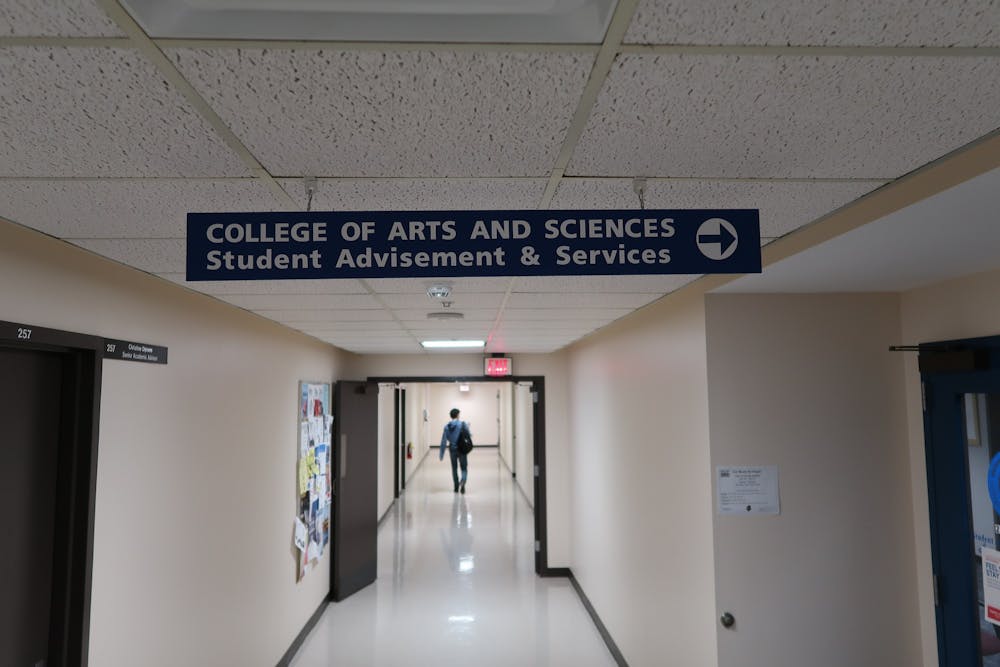Allison Hartford has only been a UB student for a few months, but she’s already lived through a multitude of the common experiences of a UB student: battling wintry weather in between lectures, cramming for a test in Capen, and getting frustrated with academic advising.
“When you go to them for help, you need to have every question laid out for them [the advisors]. They don’t do the work for you, they are just there for approval,” Hartford, a junior human services and childhood education major, said.
Advisors are supposed to help students plan a course of study so that they’ll graduate on time and find success after earning a degree. But many students said they’ve left meetings with advisors with more questions than answers, sometimes even resorting to planning their schedules by themselves.
“Most of the time, when I ask advisors about certain classes, they don’t know information about the course,” Tasmiyah Islam, a sophomore biological sciences major within the College of Arts and Sciences, said.
Students feel their time is “wasted,” and that they don’t want to meet with their advisors as much as they should.
“An academic advisor can help students navigate a variety of academic processes and answer academic questions, but advisors often also can provide referrals to other campus offices if the advisor knows there’s a different office that is best for the student to connect with,” Agnieszka Zak-Moskal, director of academic advisement in the College of Arts and Sciences, said in an email statement to The Spectrum. “If students have a question and they’re not sure who to ask, an advisor is a great person to start with.”
Students also expressed that there isn’t much of a connection between themselves and their advisors. There’s a feeling among students that advisors don’t understand what students need or are looking for in the appointment.
Grace Madden, a sophomore speech and hearing sciences major, is now in her second semester at UB after transferring in last year.
She met with her advisor two weeks ago to see if she was still “on track” to graduate in four years.
She claims her advisor told her, “Oh, well, you know, graduate when you graduate. It doesn’t matter.”
Madden left that meeting frustrated. She now tries to avoid meeting with an advisor if she can help it.
“Instead, I go to my friends or other people to try and figure it out,” Madden said. “They don’t know much, but sometimes it’s better than advising.”
There are about 35 students in the speech-language pathology major and 14 academic advisors that work with the program, according to Bo-Hua Hu, the chair of the Communicative Disorders and Sciences Department, which oversees the speech-language pathology major.
In essence, each advisor is assigned about two students. But students say that despite near one-to-one attention, a disconnect remains.
Madden pointed to Zoom meetings as a factor that contributes to this rift between advisor and student.
“I really don’t like meeting people online,” Madden said. “I would like a better connection with my advisors, but I just feel so distant. It feels impossible to get closer to them.”
But Hu said that advisors can do in-person appointments, and the appointment doesn’t need to be scheduled in advance or need any specific requirements.
“Academic advisors tend to have Zoom meetings to save time, but I think it should be in-person because it’s easier to understand them face-to-face,” Islam said.
CAS has a much larger student population, which can contribute to the detachment between students and advisors. With 19 academic advisors in the department, each of whom is responsible for about 400 to 450 students, advisors don’t have the time to get to know their students.
“CAS Advising is in the process of developing an advising lifecycle to better address the needs of our students,” Zak-Moskal said. “The advising lifecycle will help make sure that we are targeting support for students at all stages of their undergraduate experience, from before they enroll in classes to conferring their degrees.”
Zak-Moskal says CAS has listened to feedback from students of previous years, and in the past six months, the department doubled the college’s advising staff from nine to 19 over the summer, decreasing advisors’ caseloads and increasing appointment availability.
In addition to more advisors, CAS advising now offers “quick question,” a service that allows students to call an advisor with any quick questions. Students are also encouraged to email their advisors with questions.
Additionally, around the add/drop period of each semester, CAS offers drop-in advising, with no appointment necessary.
“All of this is done in an effort to increase student access to advisors,” Zak-Moskal said.
The Undergraduate Advising Council Committee also sends out a survey to students for feedback at the end of each semester. The results are directly shared with each advising unit. Each department’s director of academic advisement then reviews the results and addresses any concerns regarding advising that are shared in the survey.
Many first-year CAS students were recently invited to group-advising sessions meant to help them understand their programs and prepare for spring 2023 registration. At the end of the group-advising session, participants completed a survey and were asked how “confident” they felt registering for courses in the spring. The average response on a scale of 1-5 was a 4.1.
“Assessments like this help us identify what’s working about specific initiatives and what can be improved for the next time we offer the advising service,” Zak-Moskal said.
UB also has a web page that provides a list of responsibilities that advisors and students have, and are expected to follow.
Victoria Hill is an assistant news/features editor and can be reached at victoria.hill@ubspectrum.com





